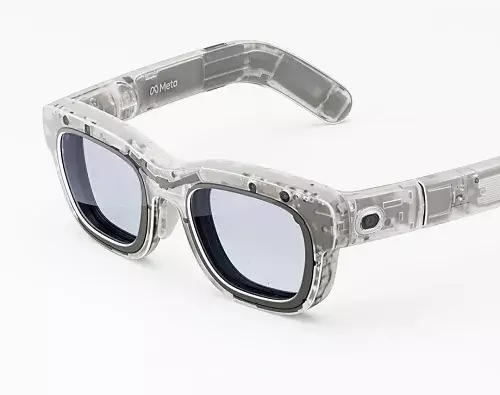In the ever-evolving landscape of technology, the shift towards augmented reality (AR) represents one of the most promising frontiers. Meta, the parent company of Facebook, has ambitious plans for its Orion AR glasses that may redefine how we interact with the world around us. Although a consumer launch isn’t slated until 2027, Meta’s strategic announcements reveal a roadmap that might elevate these glasses from mere concept to an indispensable daily accessory. As we stand on the precipice of this new era, it’s crucial to analyze what makes these devices so compelling, especially as they parallel existing technology like smartphones.
An Inside Look at the Technology
At the core of the Orion AR glasses is a commitment to simplifying usability without compromising on performance. A significant technological advancement is the introduction of the “puck”—a separate unit that enhances both computing power and battery life. This move aims to streamline the glasses’ design, which still appears somewhat bulky, and makes them more suitable for everyday wear. Meta’s approach reflects a maturation in understanding consumer demands for technology that marries functionality with aesthetics. However, despite these advancements, the challenge remains; designing AR devices that people are excited to wear, as opposed to viewing as a mere gimmick.
The glass’s future depend not just on hardware but also an amalgamation of features that make life easier. Meta has observed the escalating popularity of its Ray-Ban smart glasses, proving that when technology complements fashion, it captures attention. The driving force behind these designs isn’t merely style; it’s the integration of artificial intelligence that tailors the user experience, making technology feel organic rather than intrusive. This effort to humanize technology is pivotal; it indicates that Meta recognizes the importance of obtaining a wider audience, targeting not just tech enthusiasts but everyday consumers.
Pricing Strategy: A Game Changer?
Timelines for consumer launches often shift in the tech world, but Meta has publicly committed to a clear vision: price the Orion AR glasses comparably to modern smartphones. CEO Mark Zuckerberg has criticized competitors, particularly Apple, for their extravagantly priced AR solutions, such as the VisionPro, which can alienate potential customers. Meta seems to understand that accessibility is key to mainstream adoption. If successful, this pricing strategy might herald a new wave of consumers eager to engage with AR technology as a social norm rather than a luxury.
Nevertheless, this ambition is fraught with challenges, especially amid geopolitical tensions affecting supply chains. The reliance on overseas components could undermine Meta’s cost control, and balancing production costs against user expectations will be no small feat. As they push forward, the tech giant needs to navigate the delicate balance between affordability and revenue generation from potential advertising and subscription models. This approach could provide a sustainable revenue stream while ensuring devices remain within reach for the average user.
The Road Ahead: Beyond the Horizon of Mobile Phones
Zuckerberg’s perspective that AR glasses could eventually eclipse smartphones as the primary interface for communication demonstrates a visionary outlook. This idea sparks curiosity about a future where our interaction with technology shifts entirely. As we begin to acclimate to augmented experiences, the implications stretch far beyond just personal devices; they may revolutionize industries from education to healthcare.
Meta anticipates a landscape where technology serves to deepen connections rather than distract from them. The envisioned capabilities of AR glasses—translating spoken language in real-time or overlaying navigational data directly onto the user’s field of vision—serve to enhance rather than replace human experiences. It is a tantalizing proposition, one that invites not only excitement but also skepticism about practicality. Can Meta deliver on its bold promises?
As Meta’s Reality Labs embarks on refining the Orion AR glasses, the world watches with bated breath. The challenge is monumental; making wearable technology a seamless extension of oneself is no small undertaking. Yet, history shows that the greatest innovations often emerge from ambitious aspirations. The journey of the Orion glasses serves as a microcosm of the future of technology, interspersed with potential pitfalls and triumphs that could shape our reality in unimaginable ways. If the past is any indicator, we may very well be on the brink of an AR revolution.


Leave a Reply